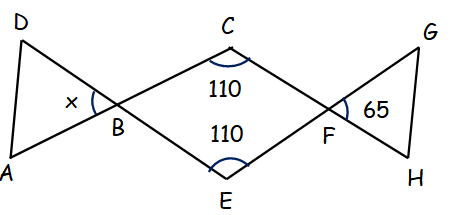PSAT SAMPLE QUESTIONS ONLINE
Question 1 :
√100 √64 =
(A) 8 (B) 10 (C) 18 (D) 80 (E) 164
Solution :
√100 √64 = √(10 ⋅ 10) √(8 ⋅ 8)
= 10 (8)
= 80
Hence the answer is 80.
Question 2 :
7.2 aliens = 1 monster
1 monster = 15.5 oranges
Using the conversion above, how many oranges are equal to 1 alien ?
(A) 0.46 (B) 1.95 (C) 2.15 (D) 22.7 (E) 111.6
Solution :
1 monster = 7.2 aliens ----(1)
1 monster = 15.5 oranges ----(2)
(1) = (2)
7.2 aliens = 15.5 oranges
1 alien = 15.5/7.2
= 2.15
Hence the answer is 2.15
Question 3 :
What is the greatest common factor of 147 and 198 ?
(A) 2 (B) 3 (C) 7 (D) 14 (E) 49
Solution :

There is no common divisor for 49 and 66. Hence the greatest common factor is 3.
Question 4 :
If x = 7 and y = 0, what is the value of 11x / (x - y) ?
(A) 0 (B) 7 (C) 10 (D) 11 (E) 77
Solution :
11x / (x - y) = 11(7) / (7 - 0) ==> 77/7 ==> 11
Hence the answer is 11.
Question 5 :
Heiga has 4 dogs, 3 cats and 2 birds. If she closes her eyes and picks one animal. What is the probability that it does not have 4 legs ?
(A) 3u/7 (B) 2/7 (C) 7/9 (D) 2/9 (E) 4/7
Solution :
Sample space = Total number of animals
= 3 + 4 + 2
n(S) = 9
Dogs and cats have 4 legs, and birds has 2 legs.
Number of animals do not have 4 legs = 2
n(A) = 2
P(A) = n(A) / n(S)
P(A) = 2/9
Hence the required probability is 2/9.
Question 6 :
If y = x2⋅xx, what is y when x = 2 ?
(A) 16 (B) 8 (C) 4 (D) 32 (E) 0
Solution :
y = x2⋅xx
y = x(2 + x)
y = 2(2 + 2)
y = 24
y = 16
Hence the answer is 16.
Question 7 :
Train A, travelling at 200 mph, leaves station A at 1 P.M train B travelling at 300 mph, leaves station B at 3 P.M. Both stations are directly across each other and X miles away. If the trains meet at 4 P.M, What is X ?
(A) 500 ml (B) 900 ml (C) 700 ml
(D) 600 ml (E) 400 ml
Solution :
From the given information, we know that both trains meet at 4 P.M.
Train A has traveled for 3 hours at the speed of 200 mph
Train B has traveled for 1 hour at the speed of 300 mph
Distance covered by both trains together
= 600 miles + 300 miles
= 900 miles
Hence both trains will meet each other apart 900 miles.
Question 8 :
Bernard is now y years old. Luis is 8 years older than Bernard. In terms of y, how old was Luis 5 years ago?
(A) 8y (B) 8y - 5 (C) y + 3 (D) y + 13 (E) y - 5
Solution :
Age of Bernard = y
Age of Luis = y + 8
5 years ago Luis age = y + 8 - 5
= y + 3
Question 9 :

In a figure above, ABC, DBE, EFG and CFH are straight line segments. What is the value of x ?
(A) 25 (B) 45 (C) 65 (D) 70 (E) 75
Solution :
In a quadrilateral BEFC,
<GFH = <EFC = 65 (Vertically opposite angles)
<CBE + <BEF + <EFC + <FCB = 360
<CBE + 110 + <EFC + 110 = 360
<CBE + 220 + 65 = 360
<CBE = 360 - 285
<CBE = 75
x = <CBE = 75 (Vertically opposite angles)
Question 10 :
Which of the following shows the fraction 13/3, 37/8 and 19/4 in order from greatest to least ?
(A) 37/8, 19/4, 13/3
(B) 37/8, 13/3, 19/4
(C) 19/4, 13/3, 37/8
(D) 19/4, 37/8, 13/3
(E) 13/3, 19/4, 37/8
Solution :
In order to arrange the fractions from greatest to least, first let us change the denominator same. For that, we have to find L.C.M of 3, 8 and 4.
L.C.M = 24
(13/3) ⋅ (8/8) = 104/24 -----(1)
(37/8) ⋅ (3/3) = 111/24 -----(2)
(19/4) ⋅ (6/6) = 114/24 -----(3)
19/4 > 37/8 > 13/3
Kindly mail your feedback to v4formath@gmail.com
We always appreciate your feedback.
©All rights reserved. onlinemath4all.com
Recent Articles
-
Digital SAT Math Problems and Solutions (Part - 150)
Apr 25, 25 11:46 AM
Digital SAT Math Problems and Solutions (Part - 150) -
AP Calculus AB Problems with Solutions (Part - 19)
Apr 24, 25 11:10 PM
AP Calculus AB Problems with Solutions (Part - 19) -
AP Calculus AB Problems with Solutions (Part - 18)
Apr 24, 25 11:06 PM
AP Calculus AB Problems with Solutions (Part - 18)
